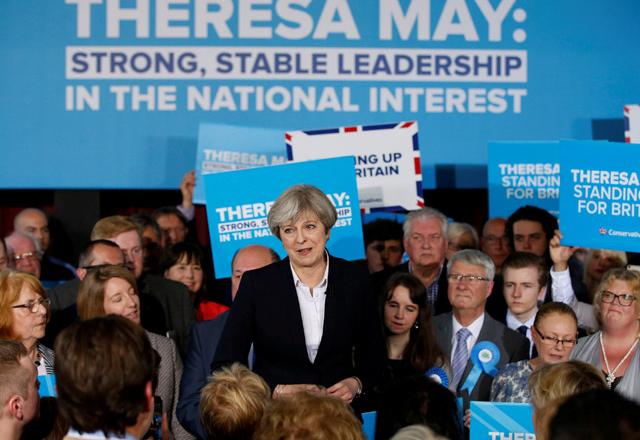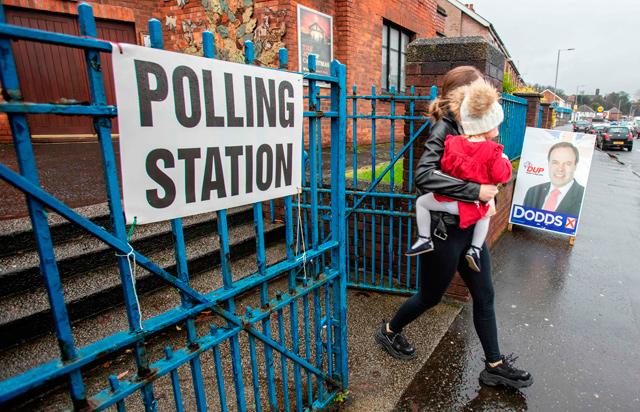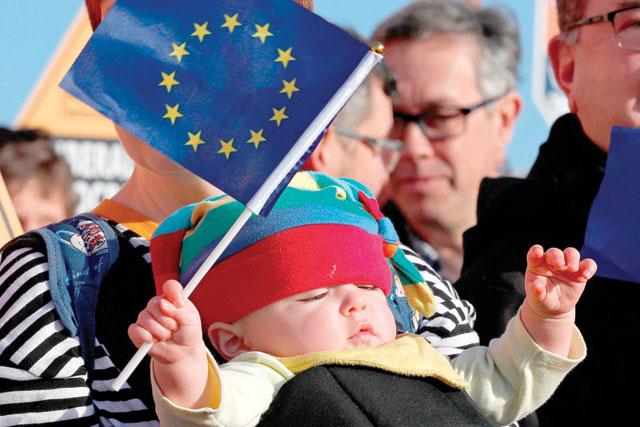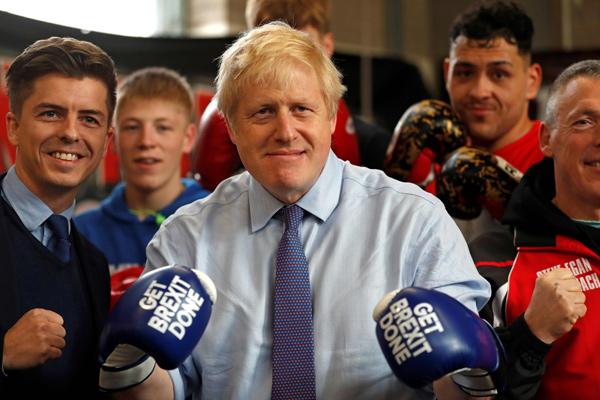You are here
On eve of election, May tries to put focus back on Brexit
By Reuters - Jun 07,2017 - Last updated at Jun 07,2017

Britain's Prime Minister Theresa May delivers a speech to Conservative Party members in Mawdesley village hall, Ormskirk, Britain, May 1 (Reuters photo)
NORWICH/LONDON — British politicians made their final pitches to voters on Wednesday, the eve of an election that will define Britain's approach to leaving the EU but has been overshadowed by two deadly attacks in as many weeks.
Prime Minister Theresa May unexpectedly called the election seven weeks ago, seeking to boost her parliamentary majority ahead of the start of Brexit negotiations and to win more time to deal with the impact of the divorce from the European Union.
But the campaign has seen a series of unexpected twists, including the bloodiest militant attack in Britain since 2005 and the shrinking of May's once-commanding poll lead of more than 20 percentage points over the opposition Labour Party.
The attacks by extremist militants in Manchester and London threw the spotlight onto security. And May was forced to backtrack dramatically on a social care policy pledge, in a move pundits said was unprecedented in British election campaign history.
On the eve of the parliamentary vote, May tried to bring the campaign back to Brexit.
"When it comes to the election tomorrow, I think the choices and the questions that people need to ask are exactly the same today as they were right at the beginning of the campaign," she told a campaign rally in Norwich.
"And the first is a question of who do you trust to actually have the strong and stable leadership that is going to deliver the best deal for Britain in Europe."
May and her husband Philip started the day with a visit to a London meat market, where they were greeted with jeers of "Vote Labour".
Later in the morning she enjoyed a warmer reception 112km away at a bowls club in Southampton, while Jeremy Corbyn, Labour leader, started the day in the Scottish city of Glasgow.
May has repeatedly said only she can deliver the right Brexit deal for Britain and that her opponents would lead its $2.5 trillion economy to ruin in the negotiations with the EU.
Pollsters expect May to win a majority.
But if she fails to surpass handsomely the 12-seat majority her predecessor David Cameron won in 2015, her electoral gamble will have failed and her authority will be undermined both inside her Conservative Party and at talks with the 27 other EU leaders.
When May stunned political opponents and financial markets by calling the snap election, her poll ratings indicated she could be on course to win a landslide majority on a par with the 1983 majority of 144 won by Margaret Thatcher.
May's poll lead has shrunk over the past three weeks. Latest surveys put her party between 12 and one point ahead. One projection said she would win a majority of 64 seats.
At least five opinion polls are expected before voting begins at 0600 GMT on Thursday.
Britons have until 2100 GMT to vote, and there will be an exit poll as soon as voting ends. The first handful of seat results are expected to be announced by 2300 GMT, with the vast majority of the 650 consituencies due to announce results between 0200 GMT and 0500 GMT on Friday morning.
‘Give hope a chance’
Britain's top-selling newspaper The Sun urged its readers to back the Conservatives, nicknamed the Tories.
"The Tories alone are committed to seeing Brexit through in full," the Sun said in a full-page editorial.
The right-wing Daily Mail said a vote for May was a "vote to save Britain".
But opposition Labour leader Jeremy Corbyn, a veteran leftist once written off by many as a no-hoper leading his party to its worst election defeat, has run a strong campaign.
The Daily Mirror urged voters to "give hope a chance" and back him in Thursday's vote.
"The choice is quite simple. Five more years of a Tory government, five more years of austerity, five more years of cuts. Or something different," Corbyn told supporters in Colwyn Bay, north Wales, to cheers and applause.
The last week of campaigning has been held in the shadow of an attack by three Islamist militants who on Saturday drove a van into pedestrians on London Bridge before stabbing and slashing dozens of people in bars and restaurants with knives.
British police confirmed the death toll had risen to eight after they found a body in the River Thames. They made another arrest in east London in connection with the attack.
The suicide bombing at a Manchester concert hall on May 22 killed 22 people. Security has been increased nationwide and the violence has dominated the final weeks of campaigning.
Corbyn has criticised May for a drop in police numbers during her time as interior minister. May hit back with a pledge to crack down on extremism and strengthen police powers.
"If human rights laws get in the way of doing these things, we will change those laws to make sure we can do them," May said in an interview with the Sun.
Liberal Democrat Nick Clegg, former deputy prime minister, called the remarks a "crass last minute attempt to divert attention from the much more difficult questions around our anti-terrorism policy".
Two of the three London Bridge attackers, who were all shot dead at the scene by police, had been known to authorities beforehand.
Italy said it had flagged Youssef Zaghba as a potential risk after he moved to England last year, while Khuram Butt was known to British security services.
Related Articles
LONDON — Britain went to the polls on Thursday to decide the future of Brexit in a snap pre-Christmas election aimed at ending years of poli
MIDDLESBROUGH, United Kingdom — Britain's political party leaders on Wednesday criss-crossed the country in a frantic last-minute push for v
LONDON — Britain's Boris Johnson and Labour leader Jeremy Corbyn go head-to-head on Tuesday in their first TV debate of the election campaig














